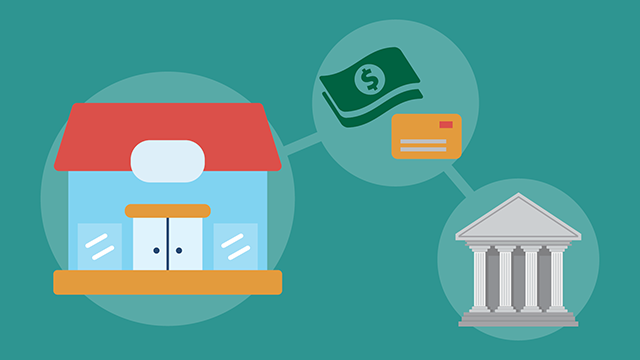The Role of Credit Report in Securing Small Company Loans for Entrepreneurs
In the affordable landscape of entrepreneurship, securing a small organization loan usually hinges on the pivotal variable of debt scores. A greater credit report score can open up doors to beneficial car loan problems, while a lower rating may present substantial barriers.
Understanding Credit Report
Credit scores are crucial numerical depictions of an individual's creditworthiness, working as a critical consider financial decision-making for lending institutions. These scores are obtained from a detailed analysis of an individual's credit rating, encompassing facets such as payment background, debt utilization, size of credit report, brand-new debt accounts, and types of debt used. Normally ranging from 300 to 850, greater ratings signify lower threat to loan providers, while reduced ratings show higher risk.
The computation of credit history is executed by credit bureaus using exclusive algorithms, with the most extensively identified models being FICO and VantageScore. Each design might consider factors slightly in a different way, however they all goal to supply a regular action of credit scores risk. A strong credit rating mirrors the person's reliability in handling financial debt, making timely payments, and keeping a healthy balance in between credit report made use of and available credit report.
It is very important for people and company proprietors to comprehend their credit history, as these numbers can have significant implications beyond personal money. On a regular basis keeping track of one's credit record, remedying inaccuracies, and embracing sound monetary habits can substantially boost credit report, consequently improving the individual's total financial profile and credit reliability.
Importance for Lending Authorization
Understanding one's credit rating rating is foundational, as it plays a substantial duty in the process of loan approval for tiny companies. Lenders use credit score scores as a key metric to evaluate the credit reliability of candidates.
In comparison, a low credit history score may signal possible threat, leading loan providers to either reject the car loan application or impose stricter conditions. This makes it crucial for business owners to be mindful of their credit rating standing, as it straight impacts their ability to accessibility capital. Moreover, credit rating scores serve as a standardized measure that enables lending institutions to improve their decision-making procedure, guaranteeing effectiveness and consistency. As little organizations usually require prompt access to funds for growth and sustainability, preserving a durable credit scores rating ends up being important. Thus, understanding and managing one's credit rating is an important element of planning for lending applications and attaining business success.
Factors Affecting Scores
Numerous aspects add to the decision of a credit history score, each playing a crucial function in shaping a person's credit history profile. A high proportion of made use of debt to offered debt can suggest monetary overextension, detrimentally influencing creditworthiness.
Size of credit report likewise variables right into credit report calculations, with a much longer credit rating typically seen extra favorably. This statistics gives insight into the person's long-lasting monetary habits, supplying lending institutions a broader point of view on their credit rating management skills. Furthermore, the kinds of credit score in use are thought about, as a mix of charge account, such as rotating charge card and installment fundings, can demonstrate the capacity to handle different economic obligations.
Finally, recent debt queries may influence ratings (pre approval student loans). Constant applications for new credit score can show financial distress, therefore negatively affecting the rating. Each of these elements is crucial in the thorough analysis of a credit report, influencing an entrepreneur's ability to safeguard a little organization funding
Improving Your Credit Score Score
Improving one's credit report is akin to nurturing a garden; cautious interest to vital areas can yield considerable renovations. To begin, ensuring prompt repayments on all charge account is crucial. Settlement history comprises a considerable part of web a credit history; hence, establishing up automated tips or settlements can help maintain uniformity. Furthermore, reducing financial debt degrees is important. High credit score application proportions, or the amount of credit score utilized family member to the credit scores limit, can negatively affect scores. Objective to maintain application listed below 30% of overall offered credit rating.

Lastly, maintaining older credit history accounts can positively influence the typical age of credit, which is an additional consider scoring versions. While brand-new credit report inquiries ought to be minimized to avoid momentary rating dips, accountable debt administration in time will naturally result in rack up enhancement, therefore improving qualification for desirable bank loan terms.
Alternate Financing Choices
Navigating the globe of small company funding often calls for discovering alternative options beyond traditional small business loan. Entrepreneurs with less-than-ideal credit rating might find these alternatives not only extra available yet additionally customized to their special business demands. Amongst one of the most prominent options are on the internet loan providers, which have actually proliferated in recent years. These platforms normally offer faster you can check here approval processes and more adaptable terms than traditional banks, frequently thinking about aspects beyond credit rating, such as business efficiency and capital.
Additionally, microloans, often provided by not-for-profit companies, cater to tiny organizations and start-ups. They use smaller loan quantities with reduced passion rates, making them ideal for business owners who need limited resources.
Invoice funding and seller money advances are additionally worth considering. The former involves marketing impressive invoices to a loan provider at a discount, while the last provides a breakthrough on future sales. Both alternatives can enhance cash circulation without the stringent credit scores requirements of traditional finances.
Conclusion

These ratings are derived from a detailed analysis of an individual's credit report background, encompassing elements such as settlement history, credit rating application, length of debt history, brand-new credit report accounts, and types of credit score used (pre approval student loans). A strong credit score shows the person's integrity in handling financial debt, making prompt settlements, and maintaining a healthy and balanced equilibrium in between credit report used and available credit
